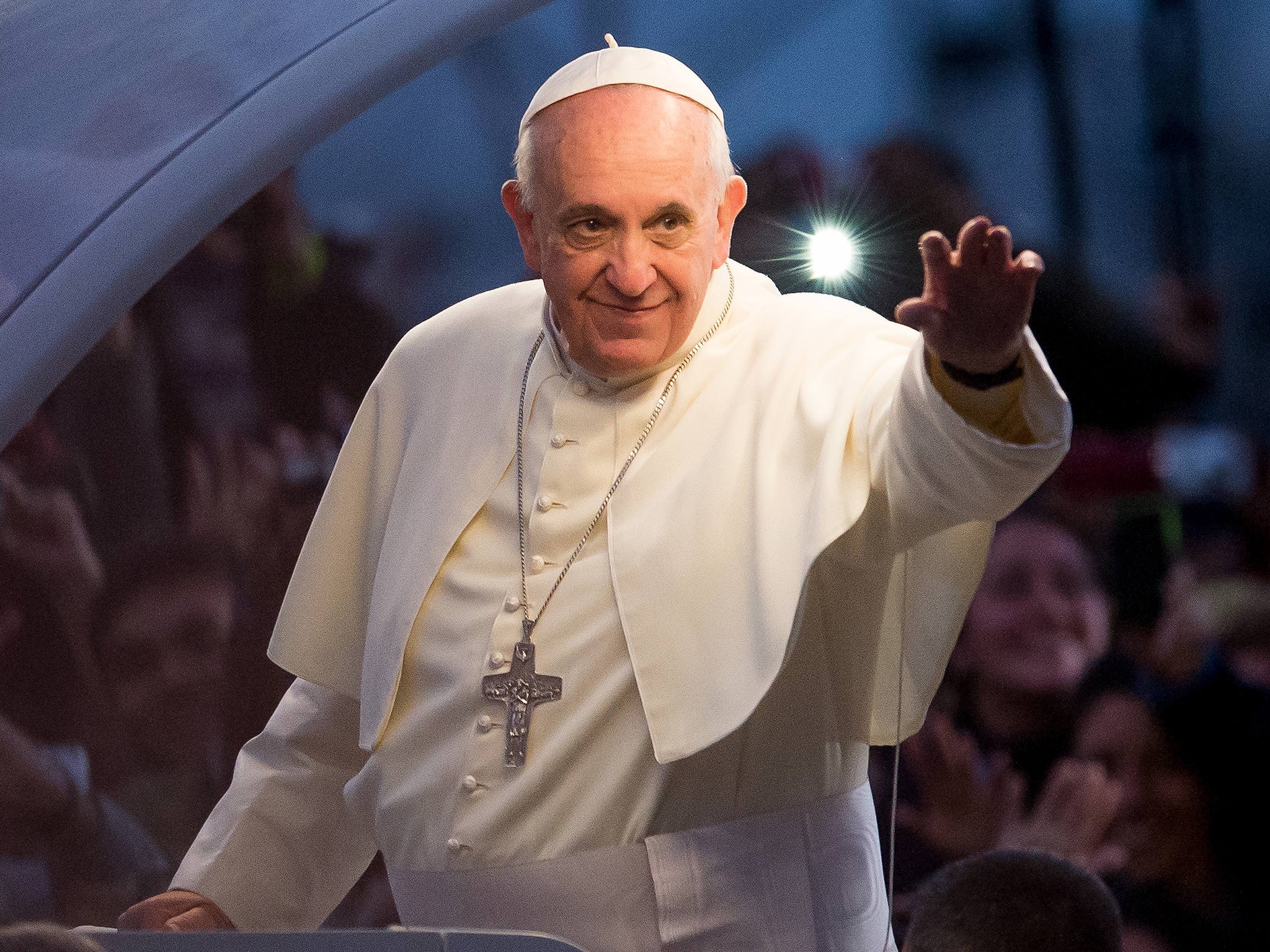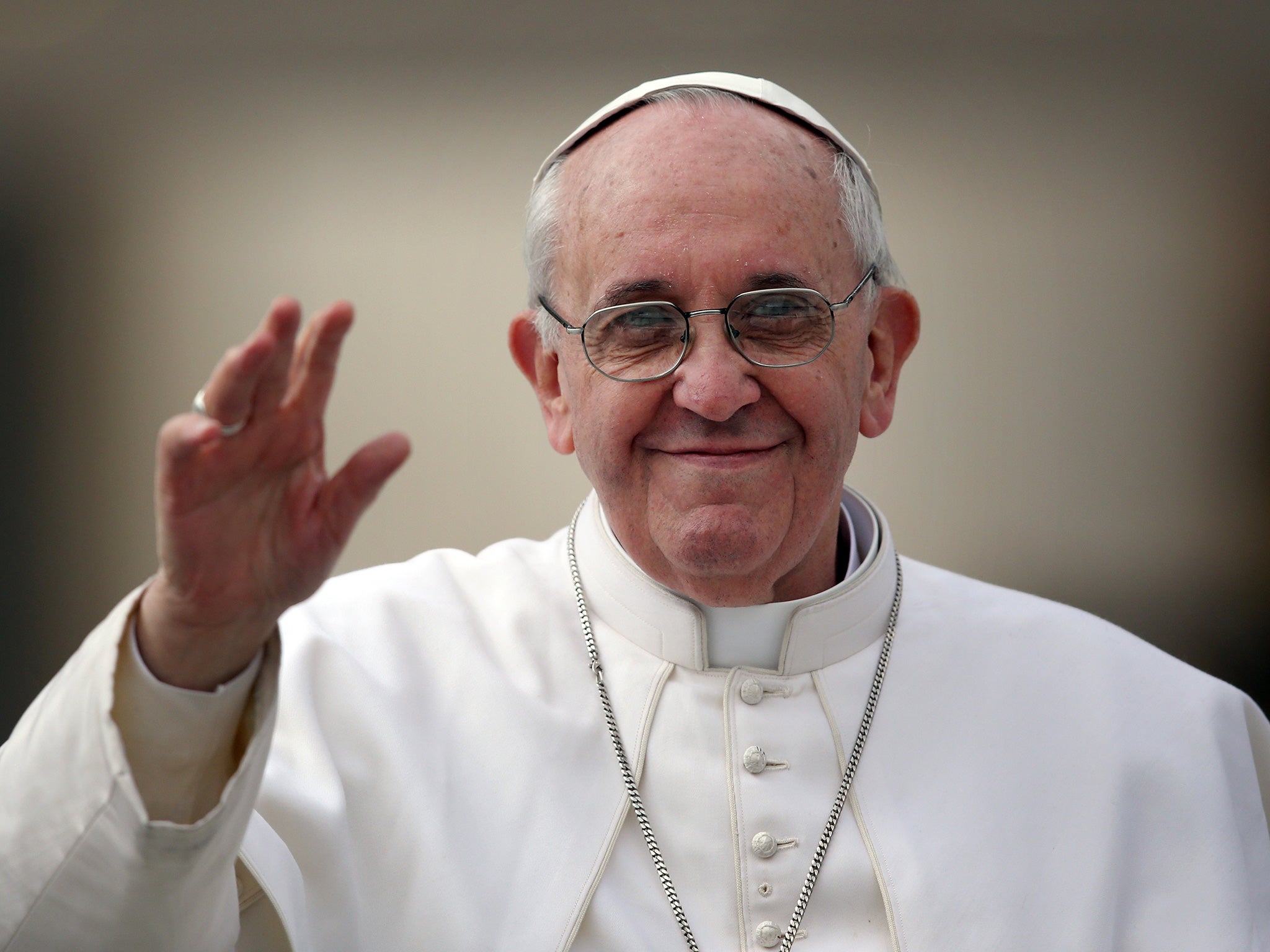Pope's encyclical release gets leaked: Here's what learned from the translation
The words are likely to anger some of his conservative critics

Your support helps us to tell the story
From reproductive rights to climate change to Big Tech, The Independent is on the ground when the story is developing. Whether it's investigating the financials of Elon Musk's pro-Trump PAC or producing our latest documentary, 'The A Word', which shines a light on the American women fighting for reproductive rights, we know how important it is to parse out the facts from the messaging.
At such a critical moment in US history, we need reporters on the ground. Your donation allows us to keep sending journalists to speak to both sides of the story.
The Independent is trusted by Americans across the entire political spectrum. And unlike many other quality news outlets, we choose not to lock Americans out of our reporting and analysis with paywalls. We believe quality journalism should be available to everyone, paid for by those who can afford it.
Your support makes all the difference.A draft of a major environmental document by Pope Francis says “the bulk of global warming” is caused by human activity and calls on people — especially the world’s rich — to take steps to mitigate the damage by reducing consumption and reliance on fossil fuels.
In words likely to anger some of his conservative critics, the pope backs the science of climate change, saying “plenty of scientific studies point out that the last decades of global warming have been mostly caused by the great concentration of greenhouse gases (carbon dioxide, methane, nitrogen oxide and others) especially generated by human action.”
“The poor and the Earth are shouting,” reads the draft of the encyclical, the first of its kind dedicated to the environment. The Washington Post translated portions of the draft.
The encyclical release had been planned for Thursday and was highly anticipated, given Francis’s enormous popularity and what many see as his potential to significantly affect policy in such areas as energy use and economic globalization.

It was timed to influence global meetings later this year about climate, unusual for such a high-level document. It was also seen as an opening salvo on the topic before the pope’s planned trip to the United States in late September.
Then the Italian magazine L’Espresso leaked the draft on its Web site, linking to it in a piece by conservative analyst Sandro Magister. The leak set off a global scurry by environmentalists, theologians, reporters and others attempting to translate it.
A Vatican spokesman, the Rev. Federico Lombardi, told journalists Monday that the document was an “intermediate version” and warned that some provisions contained in the leaked draft may be different from those in the final version.
Many religious and environmental experts — particularly those more aligned with the pope’s views on climate — declined to comment until the official document is released, in some cases voicing concern about offending the Vatican.
The draft reveals Francis as part policy wonk, part lyricist, calling explicitly in places for more investment in renewable energy and in others for evening the “ecological debt” between the Northern and Southern hemispheres, wealthy and poor countries.
“Enlighten the masters of power and money so that they should not fall prey to the sin of indifference, so that they should love the common good, support the weak, and care about this world that we inhabit,” the draft reads.
Part of the reason for managing the document’s release so tightly — even close allies of the pope said they hadn’t seen it — was because of its potentially explosive content. And translated portions of the document seemed to confirm economic conservatives’ fears that Pope Francis would frame the issue as one defined by sinful overconsumption, unrestrained free markets and unending reliance on fossil fuels.
Rumors of sabotage
The Rev. Bernd Hagenkord, head of the German-speaking section of Vatican Radio, blogged that the leak was “sabotage — somebody wants to actively undermine the pope’s message.” Citing Vatican sources, the Italian news outlet La Stampa described the leak as an attempt by elements within the Holy See to harm the pope and dull the impact of the encyclical.
In the draft encyclical, the pope states that there may be some natural reasons for global warming but strongly chastises climate skeptics.
“The attitudes hindering the paths toward a solution, even amongst the believers, go from negating the problem to indifference, to an easy resignation, or to a blind faith in technical solutions,” he writes in the draft.
The document associates polluted environments with global inequality. “I’d like to point out that the problems that hit harder at those who are excluded are often not very clear. They are the majority of those who live on the planet, they’re billions of people. They get mentioned during international political and economic debates, but their problems are mostly introduced as an addendum, something you add almost out of duty or as something peripheral. . . . But today we can’t avoid stating that a true ecological approach must always become a social approach, integrating justice in the debate around environment, so that we listen to the cry of Earth as much as we listen to the one of the poor.”
Reliance on papal teaching
“Pope Benedict proposed we should recognize that the natural environment is full of wounds produced by our irresponsible behavior,” the document reads.
In the draft, Francis openly lobbies for renewable energy and blames global warming in part on “a model of development based on the intensive use of fossil fuels.” The draft calls for “urgent action” to develop policies to reduce greenhouse gases, including “substituting fossil fuels and developing renewable energy sources.”
The pope’s encyclical has been widely anticipated by environmentalists and climate scientists as a possible victory in the climate debate that could finally help to break a political logjam and shift public opinion more strongly in favor of climate-change action.
There has been much speculation about how the document could especially move Catholic voters in the United States.
George Mason University’s Center for Climate Change Communication found that about 70 percent of U.S. Catholics think global warming is happening, a slightly higher percentage than for Americans as a whole (63 percent). Francis was the most trusted individual leader on climate change, according to the George Mason poll.
The encyclical also comes in a year with high potential for international climate action. At the end of 2015, nations will assemble in Paris for the U.N. Framework Convention on Climate Change, where they will try to hammer out a global agreement to ratchet down greenhouse gas emissions. During his U.S. visit, the pope is expected to speak at the United Nations and before Congress.
A just-released report from the International Energy Agency has amped up the pressure by showing that nations’ current pledges to reduce their emissions — without further action — would fall short of keeping warming below 2 degrees Celsius above pre-
industrial levels, a widely accepted international target. Beyond 2 degrees Celsius, it is feared, the impacts of climate change could become increasingly severe.
Sam Gregg of the Acton Institute, a faith-based group that works to promote free markets, said the leak will focus attention on potential differences between the draft text and the actual encyclical.
“If this is indeed not the final text, as the Holy See’s press office is stating, then much of the attention will be on differences between the draft text and the actual encyclical. That will fuel ultimately unprovable speculation on why the things that were changed were altered, thereby potentially distracting from the messages of the final text,” he said.
Although Francis is often assailed by Catholics who see his talk about income and climate coming at the expense of talk about issues such as abortion, some conservative theologians Monday praised the draft.
“It’s a metaphysical, poetic document,” said Chad Pecknold, a Catholic University theologian. “Being in dominion can never mean like a slave owner owns a slave. It has to be a protector, a steward, a servant, one who cares [for] and cultivates the Earth so that we have something to pass on to the next generation.”
Papal biographer Austen Ivereigh called the document “a lament for a lost connectedness.”
“It’s a very powerful argument that much that has gone wrong in our world is the consequence of forgetting that we are creatures rather than masters,” Ivereigh said Monday. “The pope is almost saying: ‘You may not believe in God, but if you believe in ecology, you can’t ignore this.’ ”
Faiola reported from Berlin. Stefano Pitrelli in Rome and Sarah Pulliam Bailey in Washington contributed to this report.
©The Washington Post
Join our commenting forum
Join thought-provoking conversations, follow other Independent readers and see their replies
Comments